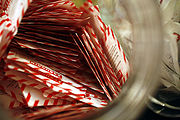
Assugrin
Encyclopedia

Sugar substitute
A sugar substitute is a food additive that duplicates the effect of sugar in taste, usually with less food energy. Some sugar substitutes are natural and some are synthetic. Those that are not natural are, in general, called artificial sweeteners....
that is a blend of cyclamate
Cyclamate
Sodium cyclamate is an artificial sweetener. It is 30–50 times sweeter than sugar , making it the least potent of the commercially used artificial sweeteners. Some people find it to have an unpleasant aftertaste, but, in general, less so than saccharin or acesulfame potassium...
and saccharin
Saccharin
Saccharin is an artificial sweetener. The basic substance, benzoic sulfilimine, has effectively no food energy and is much sweeter than sucrose, but has a bitter or metallic aftertaste, especially at high concentrations...
. Produced in Switzerland
Switzerland
Switzerland name of one of the Swiss cantons. ; ; ; or ), in its full name the Swiss Confederation , is a federal republic consisting of 26 cantons, with Bern as the seat of the federal authorities. The country is situated in Western Europe,Or Central Europe depending on the definition....
by MCM Klosterfrau Vertriebsgesellschaft, Assugrin is the main table sweetener in West Germany
West Germany
West Germany is the common English, but not official, name for the Federal Republic of Germany or FRG in the period between its creation in May 1949 to German reunification on 3 October 1990....
.
History
CyclamateCyclamate
Sodium cyclamate is an artificial sweetener. It is 30–50 times sweeter than sugar , making it the least potent of the commercially used artificial sweeteners. Some people find it to have an unpleasant aftertaste, but, in general, less so than saccharin or acesulfame potassium...
sugar substitute
Sugar substitute
A sugar substitute is a food additive that duplicates the effect of sugar in taste, usually with less food energy. Some sugar substitutes are natural and some are synthetic. Those that are not natural are, in general, called artificial sweeteners....
was discovered in 1937 by two American chemists and tested over the subsequent twenty years. After cyclamate was declared safe for consumption in the mid-1950s, the Hermes Company announced their new product, Assugrin, in 1954. Almost a decade later, in 1965, Hermes company came up with a mixture of saccharin
Saccharin
Saccharin is an artificial sweetener. The basic substance, benzoic sulfilimine, has effectively no food energy and is much sweeter than sucrose, but has a bitter or metallic aftertaste, especially at high concentrations...
and cyclamate
Cyclamate
Sodium cyclamate is an artificial sweetener. It is 30–50 times sweeter than sugar , making it the least potent of the commercially used artificial sweeteners. Some people find it to have an unpleasant aftertaste, but, in general, less so than saccharin or acesulfame potassium...
. It was later introduced to the market under Assugrin brand with wide endorsements. In that same year, aspartame
Aspartame
Aspartame is an artificial, non-saccharide sweetener used as a sugar substitute in some foods and beverages. In the European Union, it is codified as E951. Aspartame is a methyl ester of the aspartic acid/phenylalanine dipeptide. It was first sold under the brand name NutraSweet; since 2009 it...
was discovered. Aspartame was introduced into the Assugrin brand as Assugrin Gold.
In 1987, orange and lemon varieties were added to the West German low-calorie soft drink Assugrin Exquisit. In 1990, Albi launched Assugrin Aktiv (Iso-Mineral-Fitness-Drink), a reduced calorie sports drink
Sports drink
A sports drink beverage is designed to help athletes rehydrate when fluids are depleted after training or competition. Electrolyte replacement promotes proper rehydration, which is important in delaying the onset of fatigue during exercise...
. Hermes Sweeteners Ltd introduced Assugrin Light blended sweetener as a special diet food in 1995.
In 2002, the Assugrin brand was introduced to consumers in Brazil
Brazil
Brazil , officially the Federative Republic of Brazil , is the largest country in South America. It is the world's fifth largest country, both by geographical area and by population with over 192 million people...
through a new dietetic sweetener made with saccharin, water, artificial sweeteners, and sodium cyclamate.
In 2003, Swiss sweeteners producer Hermes Edulcorants, headquartered in Zurich, northern Switzerland, generated 67 million Swiss francs ($53.2 million/€44.4 million) for 2003. Their most popular brand, the Assugrin sweetener, was being sold in some 100 countries, but mainly in Switzerland, Germany, and Austria. Assugrin additionally has a significant present in the Spain and Brazil sweetener market.
In 2007, Global Industry Analysts issued a report entitled, "Artificial Sweeteners". The report analyzed the worldwide markets for artificial sweeteners in US$ Million and profiled the 108 companies serving that market, and ranked the products manufactured by those companies.

